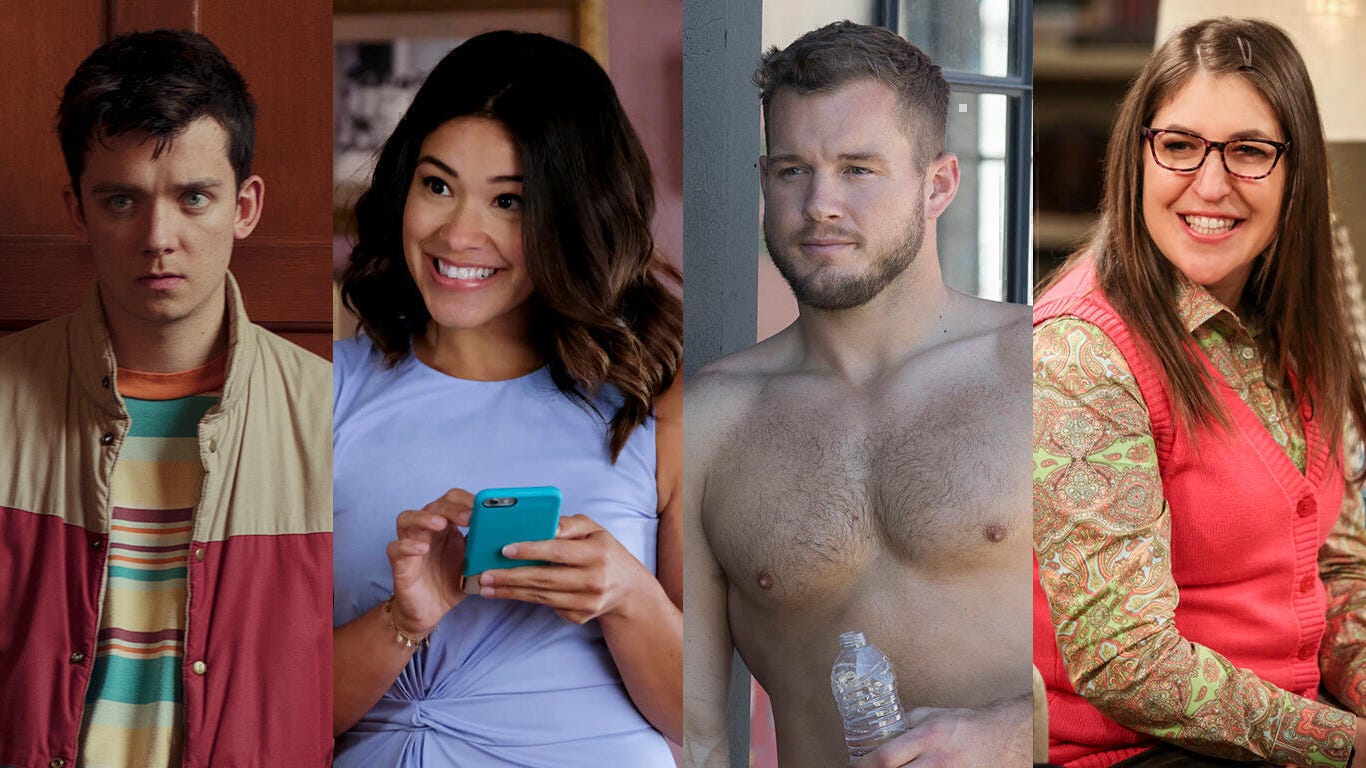
A Virgin's Take on TV Virgins
Television has come a long way when it comes to how virginity is explored on-screen, but it still has a lot further to go
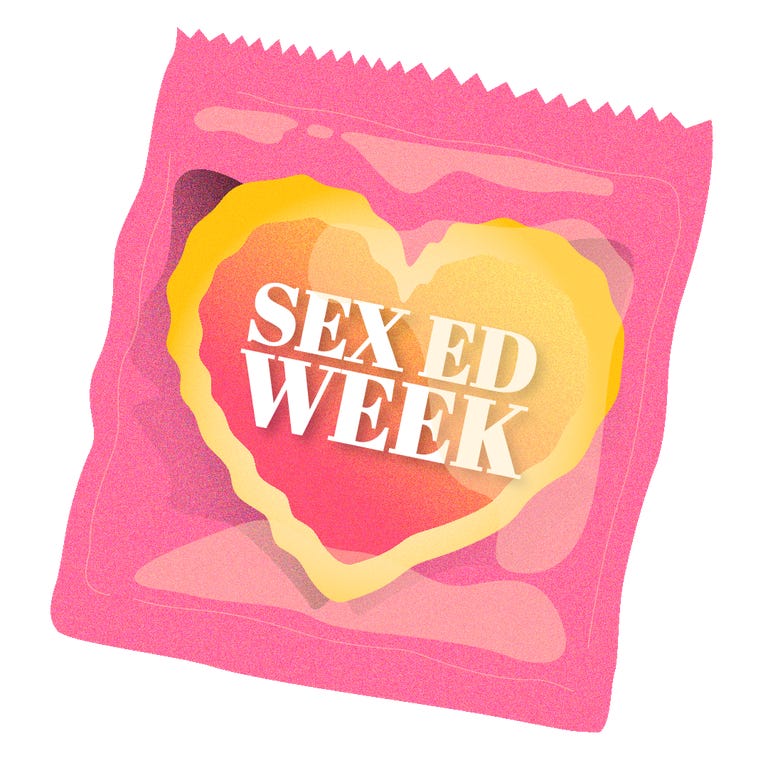
My parents never gave me The Talk. When I was in fourth grade, my mom handed me a pamphlet from the doctor's office titled "From Girl to Woman," and there was a small box on page nine labeled "Sexual Intercourse" with four traumatizing bullet points laying out how human beings procreate. Almost everything else I know about sex came from watching TV in the late '90s and early aughts, and that has a lot to do with why, 20 years after my mom handed me that pamphlet, I haven't slept with anyone.
The WB was essential viewing for young people when I hit my formative years, so my perception of dating and sexuality was shaped by shows like Buffy the Vampire Slayer, Dawson's Creek, and 7th Heaven. While each of them tackled sex in its own unique way, the message was clear that having sex at a young age would come with intense consequences. When Buffy (Sarah Michelle Gellar) lost her virginity to Angel (David Boreanaz), he lost his soul, tortured her friends, and almost sent the entire town of Sunnydale to literal hell. The only way to stop the apocalypse was for Buffy to stab her first love through the heart.
Let's Talk About TV's Evolving, Complicated Relationship With Sex
On Dawson's Creek, Jen Lindley (Michelle Williams) was considered a social pariah for having sex before precious Dawson (James Van der Beek) thought was appropriate, and the Camdens on 7th Heaven all but disowned Mary (Jessica Biel) for having premarital sex. On the opposite side of the spectrum, but equally traumatic, was Joey Potter (Katie Holmes), who spent three and a half seasons over-analyzing the pitfalls and dangers of sex before finally losing her virginity to Pacey (Joshua Jackson) in Season 4. Naturally, after they did it, she was hit with a pregnancy scare and then the disintegration of her entire friends group as she knew it.
Even when these young couples truly loved each other, disaster always struck the moment they were done messing around beneath the sheets. Could you blame anyone for being hesitant about sex when the illustrated consequences were social exile, abandonment, or god forbid, the apocalypse? It's not hard to see why I couldn't find a fellow 16-year-old for whom I was willing to risk that kind of outcome.
With so much content, why aren't we having more sensitive, honest conversations about sex -- and specifically about not having it?
I'm a little more optimistic about what modern teen shows are teaching the younger generation, who are getting exposed to series like Sex Education, which allowed its main characters to express their sexuality (or lack thereof) without shame. I felt a strong kinship, in particular, with Otis (Asa Butterfield), the series lead who felt so overwhelmed by the omnipresence of sex in his life that he preferred to stage masturbation, leaving porn, lotion, and tissues out for his sex therapist mother to find rather than actually overcome his anxieties regarding sexual pleasure. He's a great character for young people, especially young men, to relate to; Otis' journey can help them understand the pressure they feel to sexually perform isn't abnormal, and it's perfectly acceptable to work through these fears at your own pace. However, when those those anxieties continue into adulthood, the situation is a bit more nuanced. When you're young, there's so much pressure to figure out the right time to have sex, but if you hesitate for too long, you wind up grappling with the shame of being left behind.
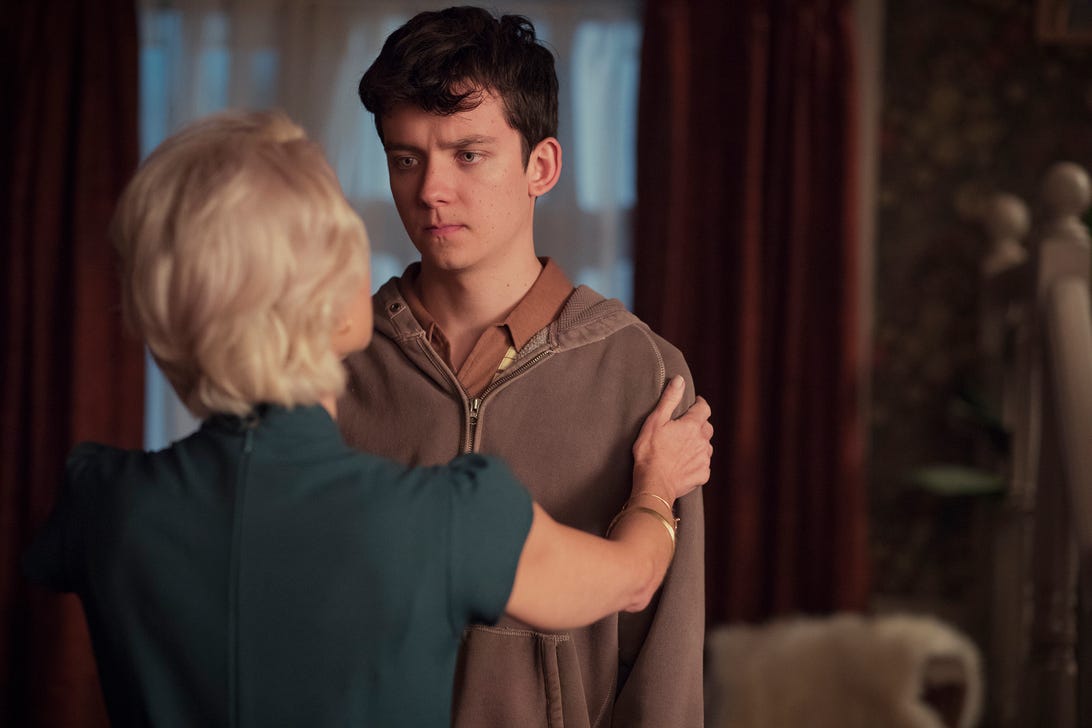
Gillian Anderson and Asa Butterfield, Sex Education
Sam Taylor/NetflixWhen people find out that I'm an adult virgin, their first assumption is that I'm a religious person saving myself for my future husband. The number of times I've even been in a church is in the single digits, however, and as a feminist in 2019, the idea of "saving myself" for anyone feels problematic on every possible level. The second assumption is that I'm not interested in sex at all. The truth is that I crave affection and companionship just like every other person, but I developed a tragic insecurity complex triggered by a traumatic slow dance with an insensitive 13-year-old boy in seventh grade that was fed over the years by poor self-care, body dysmorphia, and deeply-rooted, daddy-inspired trust issues. That complex morphed into a crippling fear of intimacy that I didn't get a chance to resolve with my therapist before she went on maternity leave, and I have yet to find someone I trust enough to replace her.
They don't make pamphlets for that, so I turn to TV as I always have. But even in the age of Peak TV and more shows on than ever, there are slim pickings when it comes to representations of adult virginity.
When It Comes to Sex and Profanity on TV, Where the F*ck Do We Draw the Line?
The first adult virgin storyline I remember seeing explored was on The Big Bang Theory. Few people will remember that when Amy Farrah Fowler (Mayim Bialik) was first introduced, she had as little interest in coitus as Sheldon (Jim Parsons); that's what made them such a good match. Then, almost overnight, Amy's dedication to her work was replaced with a carnal, unrelenting lust for Sheldon that was played for laughs over the course of multiple seasons. When Sheldon finally relented and had sex with her, it was begrudgingly, as though having sex with Amy were a chore. Amy accepted those conditions because that made it funnier, but it didn't make it more honest.
Then came Jane the Virgin, which despite its telenovela framework is one of the most authentic shows when it comes to exploring the complexities of modern relationships. Jane (Gina Rodriguez) was a 24-year-old virgin when she was artificially inseminated without her knowledge and became pregnant with her boss Rafael's (Justin Baldoni) child. Inspired by an impassioned speech from her Catholic grandmother when she was a child, Jane was saving herself for marriage and the pregnancy didn't change this, though the show made it transparent that she and her then-fiancé Michael (Brett Dier) had explored everything sexual up to actual intercourse. While I appreciate Jane tackling the problematic notion that having sex makes you impure in the eyes of God, they still emphasized this was Jane's choice and hers alone. Though multiple characters encouraged Jane to lose her virginity before marriage, an option which she ultimately abstained from, the series still allowed Jane to take full ownership of her sexuality as a virgin, all while making clear that the world wouldn't have ended had she decided differently. Because of all this, Jane wasn't ridiculed for being a virgin, which isn't the case for most people in my position.
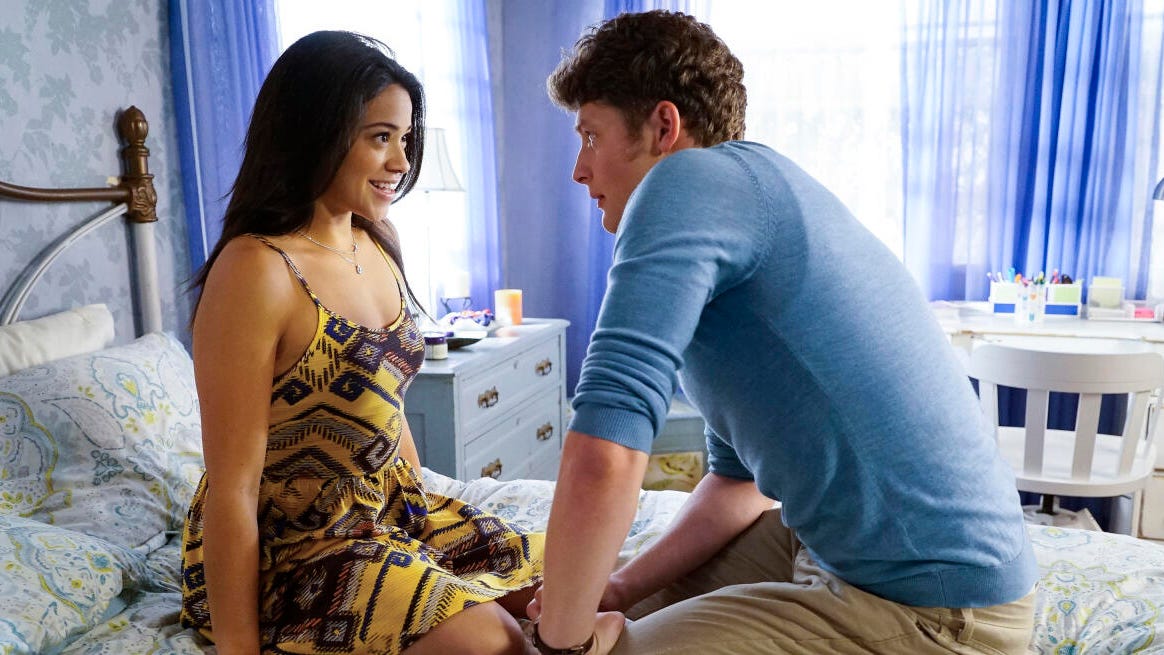
Gina Rodriguez and Brett Dier, Jane the Virgin
Greg Gayne/The CWThus, we find ourselves at Exhibit C: Bachelor Nation, which has become the epicenter for the current pop culture conversations around adult virginity. It started with Ashley Iaconetti, who went on The Bachelor in 2015 to compete for Chris Soules' heart and told the world that she was a virgin in her mid-twenties. I admired Iaconetti's bravery to confess something so personal on national TV, but I was less enchanted with the way the show and contestants treated her. She was labeled "The Virgin" for the rest of the season, and that stuck through her two stints on Bachelor in Paradise.
On Season 3 of Paradise, Bachelorette nice guy Wells Adams gave Iaconetti his penultimate rose, knowing damn well the next day would be when couples decide whether to leave the resort or go to the fantasy suites to presumably have sex. Iaconetti told the girls that she liked Adams and he was a good guy, so she wanted to see what would happen if they had time alone together. Meanwhile, in conversations with Adams, several of the other male contestants reinforced the stereotype that Iaconetti would become overly clingy if he took that step with her, and warned that he shouldn't be her first. Overwhelmed by the pressure, Adams told Iaconetti that he couldn't go through with the fantasy suites and left her crying on the beach, beseeching the producers to explain what was wrong with her that caused Adams to leave.
I admired Iaconetti's bravery to confess something so personal on national TV, but I was less enchanted with the way the show and contestants treated her.
But nothing was or is wrong with Iaconetti. Since that day on the beach, she completed a season of Bachelor Winter Games, where she left the show as part of a couple with Kevin Wendt. It's believed that Ashley lost her virginity in those fantasy suites, though she's (rightfully) never confirmed. Now, she's engaged to Jared Haibon, whom she met while filming Paradise. On the other side of the cameras, Iaconetti has been very open about her romantic journey, and she has eloquently described why it only gets harder for virgins to be open about their sexual experience, or lack thereof, the older they get.
Currently, "The Virgin" label belongs to the most recent Bachelor, Colton Underwood, an absurdly attractive 27-year-old former NFL player and the first Bachelor lead to be open about his virginity. Underwood's virginity became his "thing" during his tenure on The Bachelorette last spring when he was vying for Becca Kufrin's hand in marriage and, like Iaconetti, this label stuck as he made his way to Bachelor in Paradise last summer. His virginity was the first thing any competing male said to cut Underwood down or to make themselves feel superior when Kufrin or any other woman on the beach favored him over other potential partners.
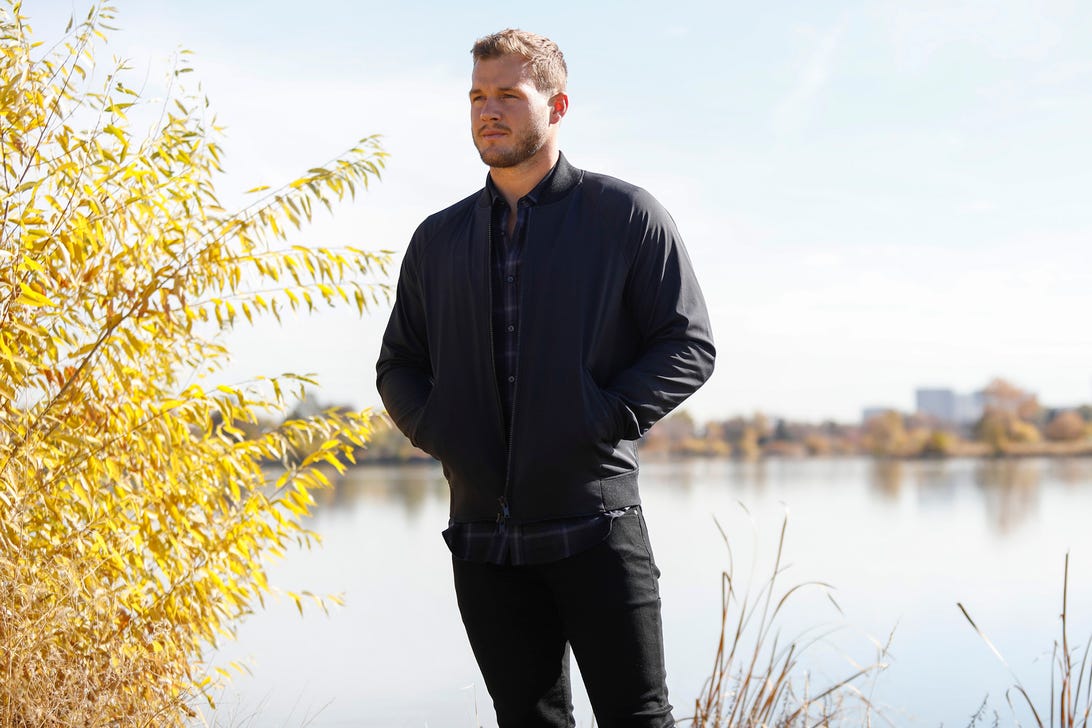
Colton Underwood, The Bachelor
Josh Vertucci, ABCThat was months before he became the guy handing out roses in the recently wrapped season of The Bachelor. ABC made the tagline of his season "What does he have to lose?" and then plastered it on advertising that saw Underwood mimicking Steve Carell in The 40-Year-Old Virgin movie posters. If you did a shot every time Underwood's virginity was mentioned in the premiere episode, you'd have gotten alcohol poisoning. Late night hosts made it the fodder for their monologues, and Jimmy Kimmel grilled Underwood in person, expressing incredulity that the Bachelor was telling the truth about his sexual status, because why someone would sign up for this level of ridicule? While Iaconetti was mocked for her potential clinginess, for Underwood, the implication behind the chiding was that he was less of a man because he hadn't had sex.
The final episode of Underwood's season featured Bachelor host Chris Harrison repeatedly teasing the audience with questions of whether or not Underwood had lost his virginity. Before the Bachelor actually came out with his girlfriend Cassie Randolph, the contestant he chose at the end of the season, the show assembled an entire panel of Bachelor Nation alums to discuss whether the couple sealed the deal in their final fantasy suite date, and they never missed an opportunity to throw in a joke about Underwood prematurely ejaculating or popping his cherry. That's from a show that proclaims every season it's in the business of really helping people "find love."
129 Things Degrassi Taught Me About Sex, Dating, and Puberty
I actually met Underwood at the Television Critics Association ABC summer party last year as Paradise kicked off, and he told me it was never his intention to announce his virginity on national TV, let alone have it become his driving narrative. When it comes to my own virginity, the thing I think about most is not how or if I'll have sex with someone -- though whether it'll ever happen is a sincere worry at this point -- but what sort of discussion we will have beforehand. The Bachelor and its spin-offs have provided platforms for real people with similar experiences and rationales for abstaining from sex, but while I feel like I relate to both Iaconetti and Underwood on a personal level, the public reaction to their virginal status makes me no less afraid of rejection and ridicule than I was in high school and college. Even in Underwood's more tender moments this season, like sharing a first kiss with fellow virgin contestant Heather, the show exploited their situation rather than building a safe space for them to be intimate with each other.
We are in an age of Peak TV, which means there are more than 500 scripted shows coming out each year, and that number continues to grow -- yet The Bachelor seems to be the only show talking about adult virginity in a multi-faceted way right now, and it's not even doing it well. With so much content, why aren't we having more sensitive, honest conversations about sex -- and specifically about not having it?
Sex is everywhere, from commercials to social media to the TV and films we consume daily. It's complicated and messy, even when you're not having it. According to the Kinsey Institute, the average age that Americans lose their virginity is 17. Another study in 2015, funded by the U.K. beauty retailer Superdrug, says that 90 percent of the population has had sex before the age of 25, and apparently only 2 percent of people haven't had sex by age 30. That means I am in the minority, but I am not alone. I just wish that the current media landscape had any interest in helping me feel that way. But adult virgins are still treated like pariahs on-screen and off, in part because the media has created a narrative that first times are universally adolescent experiences. Virgins find it harder than most to connect, and right now the media isn't even trying to represent us, never mind help us feel any less alone.
I will celebrate my 30th birthday in July. Along with the expected anxiety that comes with this particular milestone, I also feel like I have somehow failed the human experience because I haven't had sex yet; I've waited to strip down physically and emotionally in front of someone until an age when I could fully appreciate what that means, which only makes it that much more terrifying. But, I'll be brave enough to admit that I have no idea how to even begin that process. Perhaps step one is using my limited powers to ask the TV gods just one favor: Can someone please make a pamphlet for this?
(Disclosure: TV Guide is owned by CBS Interactive, a division of CBS Corporation.)
This week, TV Guide is exploring television's relationship with sex, puberty, and everything in between. As part of Sex Ed Week, we're examining the complicated and contradictory rules of TV censorship, the many life lessons we learned from Degrassi,how intimacy coordinators are changing the industry, and more. You can check out all our Sex Ed Week content here.
